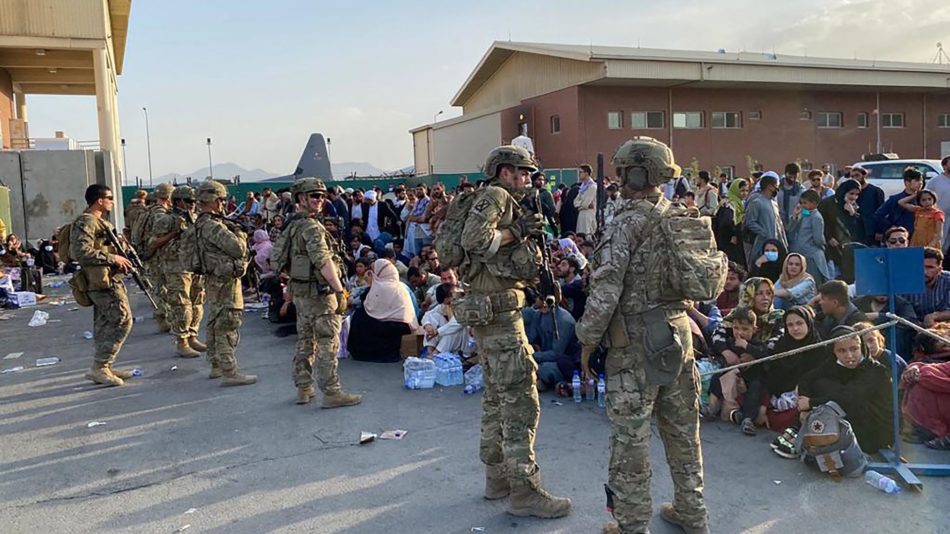Since the U.S. withdrawal in Afghanistan, there has been no shortage of solidarity statements to mourn the demise of democracy and support the rule of law in Afghanistan. I appreciate the sentiment, but I am also concerned about the loss of lives and the violations of international law that occurred during the decades of U.S. military occupation in Afghanistan and the failure of the international community to protect the sovereignty of countries.
As a gentle history lesson, the U.S. military invasion of Afghanistan was based on a series of lies perpetuated by President George W. Bush, Defense Secretary Donald Rumsfeld, and their numerous neocon chums. The U.S. was not in Afghanistan to establish democracy and respect for the rule of law and human rights. It was there to weed out the terrorists it had created decades earlier to fight the Soviet Union; the U.S. wanted to clear the field in order to secure one trillion dollars of mineral concessions for iron, copper, gold and lithium for which China and India had obtained the rights for during the U.S. occupation. In short, a decade ago, Afghanistan invited foreign investment and public bids from China, India and other countries, purposely excluding U.S. companies.
A minimal level of intellectual honesty about the historical facts and transnational business interests would help matters.
The U.S. military and its contractors served as security presence to protect assets and mineral rights already claimed to other foreign countries. In the past decade, American military forces were little more than security guards for foreign mining companies, including the Metallurgical Corporation of China, Jiangxi Copper Corporation, and the China National Petroleum Corporation.
I am disheartened that my government threatens to use sanctions as a weapon of mass starvation. If the American legal institutions are truly concerned about the lives and livelihood of millions in Afghanistan, they would urge the United States to open its borders and accept Afghan people instead of dumping them in other countries or letting them fall from the sky. My government would not scramble to freeze foreign aid to a country facing famine.
The previous Afghan government teetered on with some foreign aid. The backlash we now see is a narco-state that is fueled by a black market of opium, guns, and military equipment. Earlier this summer, Taliban fighters beat a woman to death with AK-47s because she wasn’t able to cook for them. While the Taliban is beating women with guns for not feeding them, the U.S. Department of State is freezing $9.5 billion of Afghan money in U.S controlled banks—seeking to starve millions of civilians in its self-professed effort to protect the rights of minorities and women. Yet the Taliban cannot even bend under that pressure, because it relies on physical U.S. dollars and its own trust-based system, known as hawala. The Taliban can function through its black market money systems, but the people of Afghanistan will suffer without foreign aid. If we were so concerned about the Afghan people, we would not have occupied them and sought to impose “our” version of democracy on “them” during the Cold War.
Instead we should reflect on how we arrived at this moment.
This month marks a sharp contrast to 20 years ago when planes were hijacked and commandeered into the World Trade Center and the Pentagon. Last week, we saw Afghanis clinging to U.S. military planes for a chance at a new life on these shores. Watching people fall to their deaths from U.S. military plane evacuations was similar to seeing people jumping to their deaths in the WTC as it was crumbling. The U.S. departure from Afghanistan was inevitable. We shouldn’t ask what went wrong? We need to ask: what could possibly have gone right? We followed faulty and deceptive advice on the invasion and sheepishly walked away.
All told, according to the Watson Institute for International and Public Affairs, between 480,000 and 507,000 people have been killed in the post-9/11 wars in Iraq, Afghanistan, and Pakistan waged by the U.S. military. This tally of the counts and estimates of direct deaths caused by war violence does not include the more than 500,000 deaths from the war in Syria—raging since 2011—which the U.S. joined in August 2014. According to a 2020 study also conducted under the auspices of the Watson Institute, the several wars initiated or participated in by the United States in its war against terror have caused the displacement, conservatively calculated of 37 million people in Afghanistan, Pakistan, Iraq, Libya, Syria, Yemen, Somalia, and the Philippines. Of these, an estimated 25 million people have returned home following displacement.
Today’s statements denouncing the collapse of democracy and the rule of law are essentially the same statements that could have been written 20 years ago when the U.S. invaded Afghanistan. I am sick and tired of the colonial gaze of First World nations on Third World minerals, of my government’s imperialist ambitions that rob human life and of the television news anchors who invite backers of the U.S. invasion to blast Biden for withdrawing our troops.
I want to see humanitarian assistance in Afghanistan. I want us to welcome Afghan refugees instead of letting them fall from the sky.
*The writer is a law professor at Barry University School of Law, Florida, USA.
August 28, 2021
The viewpoints expressed by the authors do not necessarily reflect the opinions, viewpoints and editorial policies of Aequitas Review.


